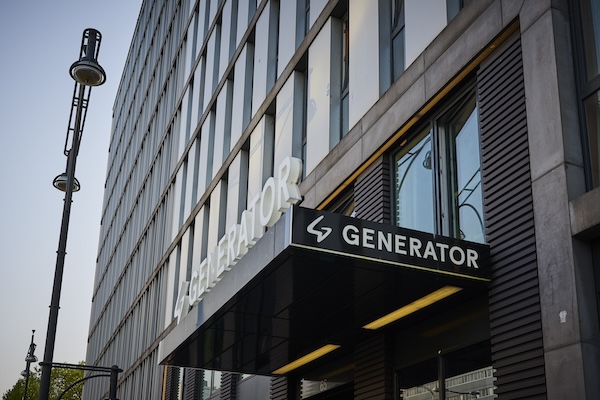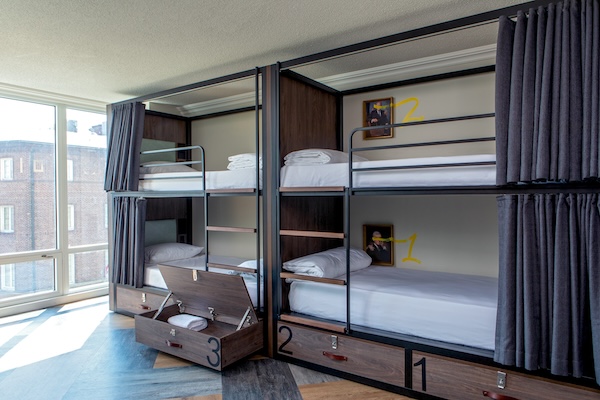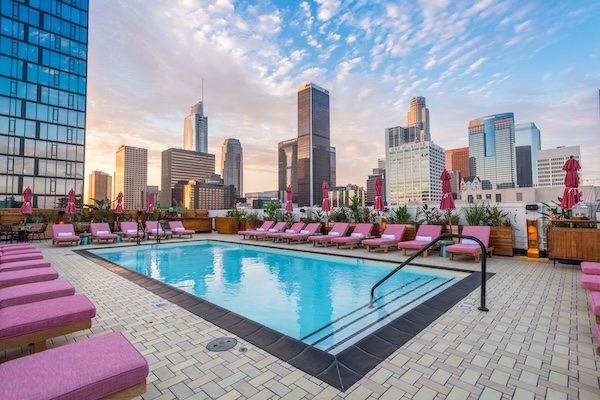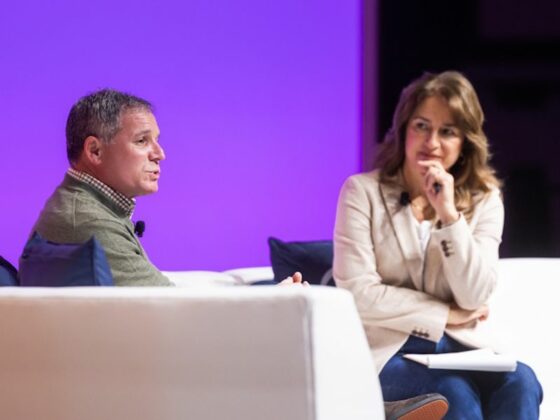In 2005, the film director Eli Roth made a movie that gave hostels a really bad name. Putting the ludicrous plot and gory violence aside, “Hostel,” a film about two college students and their bad travel choices, cast hostels in a very seedy light, which, frankly, some are. But layering on murder and mayhem only aggravated the perception. To borrow from the late Richard Lewis, this was the hostel from hell. Worse, the success of the movie produced two sequels, equally risible and bloodthirsty, but further opportunity to denigrate the accommodation type.
Alastair Thomann, the fresh-faced, half-German, half-English CEO of Generator and Freehand Hotels, has heard it all and seen it all, including the “Hostel” franchise, which, unsurprisingly, he doesn’t like, but can’t avoid its cultural phenomenon. “Everybody in the U.S. has seen this fricking movie, which in Europe, nobody knows about,” he said recently from Generator Washington DC, which is situated in the city’s Kalorama neighborhood and across Connecticut Avenue from the Washington Hilton, a hotel that holds some macabre allure of its own. It was there, in March 1981, that John Hinckley Jr. attempted to assassinate then President Ronald Reagan; colloquially, the hotel is known by the sobriquet the “Hinckley Hilton.” Generator DC is also just a quick stroll away from President Barack Obama’s D.C. residence, always secured by a protective phalanx.

On a Friday morning in May, the hotel has the expected look of a hostel-type accommodation: a throng of out-of-town students crowd the lobby area, in wait to set out no doubt for the myriad museums and monuments of the nation’s capital. When they clear, one quickly gets the sense that this is anything but some dimly lit property of disrepute. Off the lobby to the right, a hip, sunlight-filled coffee bar and cafe, while through the lobby is Hoja Taqueria, which has quickly become a local favorite for Mexican food, good tequila and salsa dancing on the weekend.
It makes sense, then, that Generator dropped the hostel appendage from its name soon after Thomann was appointed CEO in 2017 and around the time it opened its first state-side property in Miami. There is the connotation it wanted to shed, sure, but at the time of the decision, it wasn’t made to distance itself from the millennials and Gen Zers (Generator’s sweet spot is 18 to 28), who still loved the “community” concept and atmosphere, of which the brand was built on. Rather, as Thomann explained, it was more about the notion that these properties sat somewhere between hostels and boutique, lifestyle hotels.

Bankrolling the Brand
Generator is also now institutionalized. Its roots stretch back almost 30 years to London, where siblings Louise and Kingsley Duffy established one property before opening one thereafter in Berlin. Eight years later, private equity shop Patron Capital took over ownership and quickly grew the brand to 12 properties across Europe, from Paris to Amsterdam, Rome to Stockholm.
In 2017, Patron sold Generator to Queensgate for €450 million and has since expanded the brand outside the U.S., in markets like Miami and D.C. It is now on the cusp of opening its first property in New York, taking over management of the iconic Paramount Hotel Times Square. That hotel, in conjunction with Aby Rosen’s RFR, which acquired the property in 2011, is slated to debut under the Generator banner in September as one of two third-party management contracts—the other is Generator Berlin Alexanderplatz, which opened in June.
Today, there are 16 Generators in operation—with Paramount Hotel by Generator to come. They are not the only properties under Generator’s hand. In 2019, Queensgate acquired Freehand Hotels for a reported $400 million. It, and its four hotels, all in the U.S., in New York, Miami, Los Angeles and Chicago, sit a slot above Generator on the chain scale.
One of the worse-kept or not-kept secrets is that Generator is for sale, or is open to being acquired. A Queensgate exit was initially sought back in 2020, but the pandemic ended that. In 2022, a sale valued at as much as $1.2 billion resurfaced, with Queensgate calling for bids and private equity firms, from KKR to TPG, mentioned as potential suitors. Thomann doesn’t dispel it not happening imminently or farther out, but Queensgate might be slow playing it on the back of record asset performance, which is why it went ahead and refinanced 13 properties toward the end of 2023 for a reported $802 million. “The numbers are just going like this,” Thomann said as he mimicked an airplane going upward with his right hand.
Last year was a banner year for the combined Generator and Freehand with a 28% year-over-year increase in EBITDA from 2022, driven by a 15% increase in revenues. Both brands benefitted and should benefit further from the Taylor Swift bounce. Generator Miami and Freehand Miami bookings are expected to climb some 700% when Taylor Swift’s 2024 Eras Tour rocks Hard Rock Stadium October 18–20. Bookings were already up by 30% during Miami Music Week in March. Generator Stockholm and Dublin are forecasting a 50% YOY increase in revenues during the 2024 Eras Tour, while Freehand Los Angeles bookings were up by 15% during Coachella.
Interest in what was a niche, overlooked space is now high amongst institutional investors. An example being TPG’s 2023 sale of the 40-property a&o Hotels and Hostels for €800 million to private investment firms StepStone and Proprium. Another hotel chain, similar in ethos and feel to Generator, Meininger Hotels has been rumored for some years to be up for sale by owner Cox & Kings. It’s all part of a move toward consolidation in the industry, Thomann believes. “If you look at the big players, there’s going to be consolidation. You can feel it,” he said.
So-called bolt-on acquisitions by major hotel companies continue to have their day. Examples are recent (Hilton’s purchase of Graduate Hotels) to older (the 2022 acquisition of Germany’s Vienna House brand by Wyndham). A potential sale of Generator could include both brands packaged together or separated out, Thomann said.

Pigeonholing Generator
Beyond its Hollywood portrayal, hostels, and Generator by extension, imply shared accommodations, bunk beds, communal bathrooms, rooming with complete strangers. It conjures travelers hauling immense backpacks—mainstream traveling it is not. Generator straddles both sides, a hybrid of shared and traditional accommodations. Consider its D.C. property: 25% of the accommodations are shared and individuals can book single beds for as low as $25 per night, depending on the time of year. At all Generator properties, there is the ability to book a single bed in a room, though, as Thomann pointed out, that won’t be the case in New York, where prostitution laws prohibit it.
Most of the newer Generator hotels have en-suite bathrooms only, while some of the older, European properties still include shared hallway bathrooms, which, for those solely booking a bed, is preferable: “Who wants to get woken up in the middle of the night?” Thomann said.
Meanwhile, Generator has appealed even more to traveling families post-pandemic, who, instead of paying for two rooms, can book a private four-bed room where accommodations look strikingly similar to a sleeping car on a train. As Thomann pointed out, there is true value in this, where four- or even three-star hotels have priced out some families. “You have the same 270 square feet of room, where the whole family can stay together,” he said. “It’s an affordable alternative.”
Don’t get it twisted: To believe that Generator is a low-cost alternative with slim profit margins is to not understand the complete model and offering. One of its more popular properties Generator Amsterdam has rooms that go for more than €500 per night. At Generator Miami, a superior suite has a flexible rate that reaches over $530 a night before taxes and other fees. And, as Thomann pointed out, room revenue is not actually where it makes its money. The 76-room Miami hotel does around $3 million per year in room revenue. It does more than double that in alcohol sales, Thomann said. “Our demographic is social and will spend money on ancillary products,” he said.
Generator further benefits from ancillary revenue by turning to an airline model and charging for ad-hoc products, like $5 for a lock (shared rooms have lockers for safe storage) or another $5 for towel. “It makes the total expenditure that much higher,” he said.
In stronger months, Thomann said profit margins can run as high as 75% in some of the hotels, entirely because of the business model. As he explained it: “We can achieve the same rates as a four-star hotel, while operating with one- or two-star costs.”

Growing Up and Out
Generator’s growth is through conversions, which allows it to be in the most desirable city locations. The Generator Madrid, right off the bustling Gran Vía, was a parking garage conversion. Meanwhile, Generator Dublin is located in the hip Smithfield neighborhood, close to Temple Bar.
When it comes to locations, Generator Paramount, a relaunch of the former Paramount Hotel, which for two decades was under the operating thumb of Ian Schrager and received a Philippe Starck-led makeover in 1990, is in a prime position in Manhattan’s Theater District, abutting Times Square. How Generator won the operating contract for the 600-room hotel is a question Thomann often gets. Rightfully so: “Why the hell would they pick Generator?” he said. The answer, again, is in the business model, which Aby Rosen, a legendary New York real estate tycoon, whose hotels have included the famed Gramercy Park Hotel and skyscrapers like the Mies van der Rohe-designed Seagram Building, is a believer in. Loads of management companies vied for the hotel (Highgate managed it previously), but as Thomann told it, all he had to do was show Rosen a Generator profit-and-loss statement. It bowled him over and sealed the deal.
It was a similar deal in Berlin, where Generator already had two hotels. Three might be a crowd, but it didn’t prevent Schroders Capital from installing Generator as the operator of the newly opened Generator Berlin Alexanderplatz, which Thomann calls an “insane location.” Once again, Generator, Thomann argued, sold itself. The model, Thomann conceded, doesn’t work everywhere, but in the markets it seeks out, it does. Alexanderplatz in a year should do as much as two-and-a-half times better than the property did before when it operated as ONE80° Hostels Berlin, Thomann said. “I call it high compression markets—high rate, high occupancy. That’s where we excel,” he said. “What we do is we maximize the return per square meter.”
The focus is now on opening the Paramount and getting that right before announcing any new Generator deals. But they are out there and soon to come. Generator is still a rather small outfit, around 35 people sit in its London headquarters, but they are scaling up. Thomann didn’t offer specifics, but said that the next properties announced will be in Asia, Australia and the Middle East, likely asset-light, third-party management contracts. Ultimately, Thomann said there are enough markets for as many as 120 Generator properties.
Freehand, meanwhile, is not as much a volume play, but 40 to 50 is not out of the realm of possibility, Thomann suggested. They require and rely on a large volume of food and beverage and unique locations and often historic buildings. Freehand Los Angeles, for instance, was converted from the Commercial Exchange Building and opened in 2017. The building was listed on the National Register of Historic Places in 2019. Freehand New York Hotel in Gramercy Park was initially the George Washington Hotel, which originally opened in 1928. Freehand Chicago, née the Devonshire Hotel, which dates back to the 1920s, opened in 2015.
Looking to the future is how Thomann sets the course for Generator. That and courting owners by pushing its value proposition built on efficiency. “For us, 2024 has already happened. I’m all about 2025 and 2026,” he said. “We’re contracting now for then and the biggest relief is to see that 2025 is going to be even stronger than 2024. This whole fear of at what point do markets tip? It doesn’t seem to be happening. Thank goodness.”








